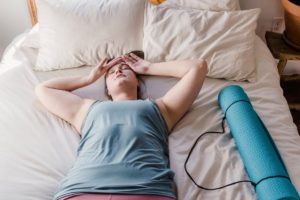Studies have shown that a lack of sleep at night can have a serious impact on your health, both in the short and long run. In this post, we’ll uncover the ways sleep deprivation can affect your body and mind.
Most people know that getting a good night’s sleep is important. But few know the extent of the effects that lack of sleep can have on the body and mind. This blog post will explore some the most serious ways lack of sleep at night can affect your health.
By understanding these consequences, you can make a more informed decision about how much sleep is right for you. Let’s get started!
- How can the lack of sleep at night affect your health?
- 1. Lack of sleep is linked to chronic illnesses, including obesity & heart disease
- 2. Lack of sleep at night increases risk for accidents
- 3. Lack of nighttime sleep can affect your immune system
- 4. Lack of sleep makes you more prone to depression and other psychiatric disorders
- 5. Lack of nighttime sleep can affect your brain functions
- 6. Lack of sleep can lead to toxic behaviors
- 7. Lack of sleep can make you appear older
- 8. Lack of nighttime sleep can increase your chances of dying from any cause
- 9. Lack of sleep can lead to a decline in cognitive function
- 10. Lack of sleep can cause moodiness and irritability
- 11. Lack of sleep at night can lead to a loss of productivity
- 12. Lack of sleep may leave you feeling more stressed out and tired
- 13. Lack of sleep can affect your ability to maintain strong social bonds
- 14. Lack of sleep causes your body's temperature regulation system to slow down
- Final words on the ways lack of sleep at night can affect your health
- How can I naturally improve my sleep?
- What are the main causes of lack of sleep?
How can the lack of sleep at night affect your health?
Sleep is one of the most important factors for your health.
The ways that getting enough sleep can affect you both mentally and physically include:
- Increases risk of chronic diseases including obesity, heart disease and diabetes.
- Increases risk of accidents and falls.
- Affects immunity leading to infections.
- Makes you more prone to depression and psychiatric disorders.
- Affects your brain function: memory, decision-making & performance.
- Leads to toxic behaviors and risky sexual activities.
- Makes you appear older.
- Causes premature death.
- Leads to cognitive decline.
- Causes moodiness and irritability.
- Decreases productivity and earning power.
- Makes you more stressed and tired.
- Affects social bones.
- Slows down the body’s core temperature regulation process.

“Sleep's what we need. It produces an emptiness in us into which sooner or later energies flow.” ― John Cage
1. Lack of sleep is linked to chronic illnesses, including obesity & heart disease
Obesity and sleep deprivation
People who get less sleep are more likely to be obese.
Imagine for a second that you could be increasing your odds of being obese with every hour of sleep lost.
According to research, lack of sleep leads to increased hunger which causes increased calorie intake.
This may be due to changes in hormonal levels such as leptin which is associated with creating a sensation of fullness.
Additionally, people who are tired tend to eat more calorie-rich foods and partake in late night snacking in an effort to boost their energy levels.
Heart disease and sleep deprivation
The lack of sleep has been linked to an increased risk of heart disease and stroke.
One study found that people who are sleep deprived are more than twice as likely to have a heart attack than those who get more sleep.
This may be due to the fact that lack of sleep can lead to high blood pressure and a higher risk of blood clots.
Diabetes and sleep deprivation
Poor sleep can cause your blood sugar to rising, which increases the risk of diabetes.
In fact, even one night of sleep deprivation has been shown to increase insulin resistance.
2. Lack of sleep at night increases risk for accidents
Car accidents and sleep deprivation
One study found that people who sleep for fewer than seven hours per night are more likely to get in a car accident than those that don’t.
In fact, the risk is much greater for those that sleep less than 4 hours.
This may be due to the fact that lack of sleep can lead to drowsiness and impaired judgement.
Work accidents and sleep deprivation
The lack of sleep also makes it more likely to have an accident at work.
This may be due to the fact that lack of sleep can lead to slowed reaction times and poor judgement.
Falls and sleep deprivation
Elderly people who don’t get enough sleep are at a higher risk of falling and injuring themselves.
This may be due to the fact that lack of sleep can lead to balance problems and slow reflexes.
Unfortunately, these falls can lead to both mental and physical suffering.
Notably, about 30% of persons 65 years or older are injured due to falls each year.

“Sleep deprivation, it seems, can giveth as much as it taketh away!”― A.D. Aliwat
3. Lack of nighttime sleep can affect your immune system
Cold and flu and sleep deprivation
People who don’t get enough sleep are more likely to catch a cold or the flu.
This may be due to the fact that lack of sleep can impair the immune system’s ability to fight off infection.
Actually, lack of sleep can have a negative impact on overall health and well-being.
4. Lack of sleep makes you more prone to depression and other psychiatric disorders
Depression and sleep deprivation
People who don’t get enough sleep are more likely to suffer from depression. In fact, there are strong links between sleep and depression.
This may be due to the fact that lack of sleep can lead to changes in mood and decreased energy levels.
Other psychiatric disorders and sleep deprivation
Sleep deprivation has also been linked to an increased risk of developing other psychiatric disorders, such as anxiety and bipolar disorder.
This may be due to the fact that lack of sleep can lead to changes in mood and cognitive function.
5. Lack of nighttime sleep can affect your brain functions
Memory and sleep deprivation
Poor sleep can lead to memory loss and cognitive decline.
Studies show that people who slept for fewer than five hours per night performed worse on tests of memory and cognitive function than those who slept for seven hours or more.
This may be due to the fact that sleep is necessary for the brain to consolidate memories.
Decision-making and sleep deprivation
Poor sleep can also lead to decreased judgement and decision-making ability.
In fact, sleep deprivation is linked to poor decisions even in simulated work environment.
This may be due to the fact that lack of sleep can lead to slowed reaction times and impaired judgement.
Performance and sleep deprivation
Poor sleep can also affect your performance at work or school.
This may be due to the fact that lack of sleep can lead to decreased energy levels and difficulty concentrating.

“It is better to sleep on things beforehand than lie awake about them afterward.” - Baltasar Gracian
6. Lack of sleep can lead to toxic behaviors
Toxic behaviors and sleep deprivation
Poor sleep can lead to toxic behaviors such as smoking, drinking, and drug use.
In fact, research in adolescents showed that those who slept less than eight hours was significantly associated with drinking and smoking.
Actually, sleep deprivation is an epidemic among teens with numbers being higher than 80% among high school students.
This may be due to the fact that lack of sleep can lead to decreased energy levels and mood swings.
Risky sexual activity and sleep deprivation
Poor sleep can also lead to increased chances of risky sexual activity.
One study found that teens who are sleep deprived were more likely to engage in risky sexual activity including having unprotected sex and having intercourse under the influence of alcohol and drug.
This may be due to the fact that lack of sleep can lead to decreased energy levels and judgement.
Notably, lack of sleep is also associated with decreased testosterone levels.
Read also: 23 Toxic behavior traits you should quit to change your life.
7. Lack of sleep can make you appear older
Aging process and sleep deprivation
Poor sleep can speed up the aging process in your body.
In fact, people who sleep for fewer than six hours per night are more likely to look years older than those who sleep for eight hours or more.
They are more likely to have premature wrinkling, age spots and bags under the eyes.
This may be due to the fact that lack of sleep can lead to decreased energy levels and a decrease in the production of collagen, which is necessary for healthy skin.
Let’s face it, wrinkles are bag under the eyes
8. Lack of nighttime sleep can increase your chances of dying from any cause
Risk of death and sleep deprivation
Poor sleep can increase your chances of dying from any cause. This may be due to the fact that lack of sleep can lead to decreased immunity and an increased risk of health problems.

“All she really wanted to do was sleep, but it seemed her awareness level was operating at peak efficiency, for some reason.” ― Jason Medina
9. Lack of sleep can lead to a decline in cognitive function
Cognitive function and sleep deprivation
Poor sleep can lead to a decline in cognitive function, making it difficult to concentrate and solve problems.
This may be due to the fact that lack of sleep can lead to decreased energy levels and a decrease in the production of serotonin, which is necessary for cognitive function.
10. Lack of sleep can cause moodiness and irritability
Mood and lack of sleep
Poor sleep can cause moodiness and irritability, as well as affect your judgment and perception of situations.
Studies show that people who are sleep deprived are more likely to be irritable and have a shorter temper than those who sleep for seven hours or more.
11. Lack of sleep at night can lead to a loss of productivity
Productivity and sleep deprivation
Poor sleep can lead to a loss of productivity, which leads to diminished earning power over time.
This may be due to the fact that lack of sleep can lead to decreased energy, concentration and cognitive function.
As such, poor sleep can also lead to a decrease in earning power over time.
Read also: Ultimate guide on personal productivity
12. Lack of sleep may leave you feeling more stressed out and tired
Stress and sleep deprivation
Poor sleep may leave you feeling more stressed out than usual because it causes your body to release the stress hormone cortisol.
Dopamine and sleep deprivation
Poor sleep can leave you feeling tired because it hinders your body’s ability to produce the energy-boosting hormone dopamine.
13. Lack of sleep can affect your ability to maintain strong social bonds
Social bonds and sleep deprivation
Poor sleep can affect your ability to maintain strong social bonds because it puts you in a bad mood and keeps you from being your best.
Studies found that sleep deprivation is linked to loneliness and social withdrawal.
Notably, both loneliness and social withdrawal are linked to physical and mental comorbidities and early death.
14. Lack of sleep causes your body’s temperature regulation system to slow down
Body temperature and sleep deprivation
Poor sleep can also cause your body’s temperature regulation system to slow down, which could make it difficult for you to get warm when you’re cold.

“My nights are for overthinking. My mornings are for oversleeping.” ― Unknown
Final words on the ways lack of sleep at night can affect your health
Undeniably, the lack of sleep at night can affect your health in a number of ways, some of which are quite serious.
However, by understanding the effects of sleep deprivation on your body, you can take steps to get the adequate rest you need each night.
If you’re having trouble sleeping, talk to your doctor about possible solutions.
Also, be sure to check out my other blog posts for more information on how to maintain a healthy lifestyle. Thanks for reading!
Related topics
How can I naturally improve my sleep?
Are you struggling to get a good night’s sleep? You’re not alone.
In fact, millions of persons report difficulty sleeping at least once a week.
While there are many things you can do to improve your sleep habits, some people turn to natural methods.
In this blog post, we’ll discuss four ways you can improve your sleep naturally.
Keep reading for more information.
What are the main causes of lack of sleep?
We all know that getting a good night’s sleep is essential for our health, but many of us don’t get the recommended seven to eight hours each night.
So what are the main causes of lack of sleep?
According to recent studies, there are several factors that can contribute to sleep deprivation. Here I’ll discuss some of the most common ones.
References
American Academy of Sleep Medicine. “Sleep Deprivation Can Lead To Smoking, Drinking.” ScienceDaily. ScienceDaily, 14 June 2007.
Ben Simon E, Walker MP. Sleep loss causes social withdrawal and loneliness. Nat Commun. 2018 Aug 14;9(1):3146.
Brian C Tefft. Acute sleep deprivation and culpable motor vehicle crash involvement. Sleep, 2018.
Cooper CB, Neufeld EV, Dolezal BA, Martin JL. Sleep deprivation and obesity in adults: a brief narrative review. BMJ Open Sport Exerc Med. 2018 Oct 4;4(1):e000392.
Noh JW, Kim KB, Lee JH, Lee Y, Lee BH, Kwon YD. Association between Sleep Duration and Injury from Falling among Older Adults: A Cross-Sectional Analysis of Korean Community Health Survey Data. Yonsei Med J. 2017 Nov;58(6):1222-1228.
Nutt D, Wilson S, Paterson L. Sleep disorders as core symptoms of depression. Dialogues Clin Neurosci. 2008;10(3):329-36.
Peng Z, Dai C, Ba Y, Zhang L, Shao Y, Tian J. Effect of Sleep Deprivation on the Working Memory-Related N2-P3 Components of the Event-Related Potential Waveform. Front Neurosci. 2020 May 19;14:469.
University of Warwick. “Lack Of Sleep Doubles Risk Of Death, But So Can Too Much Sleep.” ScienceDaily. ScienceDaily, 24 September 2007.
Van Cauter E, Blackman JD, Roland D, Spire JP, Refetoff S, Polonsky KS. Modulation of glucose regulation and insulin secretion by circadian rhythmicity and sleep. J Clin Invest. 1991 Sep;88(3):934-42.
Rushana Greenidge-Horace










Leave a Reply